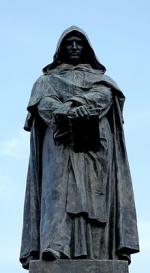Disable ads!
Giordano Bruno
Giordano Bruno (Italian: [dʒorˈdano ˈbruno]; Latin: Iordanus Brunus Nolanus; 1548 – February 17, 1600), born Filippo Bruno, was an Italian Dominican friar, philosopher, mathematician, poet, and astrologer. He is celebrated for his cosmological theories, which went even further than the then-novel Copernican model, proposing that the stars were just distant suns surrounded by their own exoplanets, and moreover the possibility that these planets could even foster life of their own (a philosophical position known as cosmic pluralism). He also insisted that the Universe is in fact infinite, thus having no celestial body at its "center". Beginning in 1593, Bruno was tried for heresy by the Roman Inquisition on charges including denial of several core Catholic doctrines (including the Trinity, the divinity of Christ, the virginity of Mary, and Transubstantiation). Bruno's pantheism was also a matter of grave concern. The Inquisition found him guilty, and in 1600 he was burned at the stake in Rome's Campo de' Fiori. After his death he gained considerable fame, particularly among 19th- and early 20th-century commentators who regarded him as a martyr for science, though scholars emphasize that Bruno's astronomical views were at most a minor component of the theological and philosophical beliefs that led to his trial. Bruno's case is still considered a landmark in the history of free thought and the future of the emerging sciences. In addition to his cosmological writings, Bruno also wrote extensively on the art of memory, a loosely organized group of mnemonic techniques and principles. Historian Frances Yates argues that Bruno was deeply influenced by Arab astrology, Neoplatonism, Renaissance Hermeticism, and the Egyptian god Thoth. Other studies of Bruno have focused on his qualitative approach to mathematics and his application of the spatial paradigms of geometry to language.
 Read more on wikipedia.org Read more on wikipedia.org
 All quotes by Giordano Bruno All quotes by Giordano Bruno
 Edit Edit
|

|
|
|
|
|
Background photo by Giuliana
|